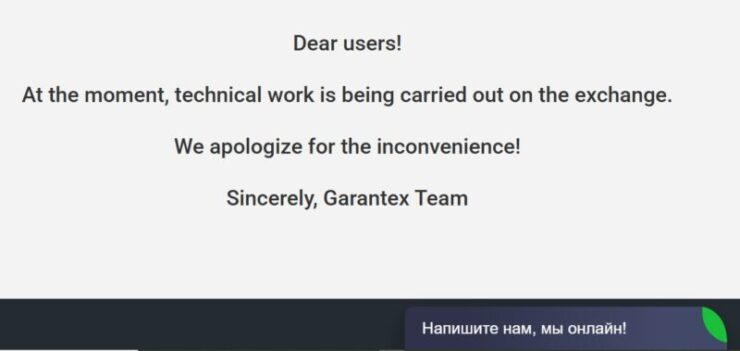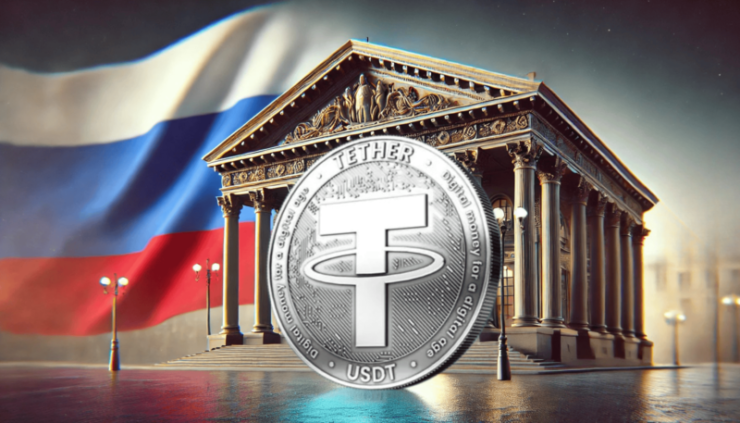Tether has taken decisive action by freezing $27 million worth of USDT on the Russian cryptocurrency exchange Garantex, following its inclusion in the European Union’s latest round of sanctions. As a result, Garantex has been forced to suspend all services, including withdrawals, while its website remains under maintenance.
The freeze on Garantex’s funds came after the exchange was sanctioned by the European Union as part of its ongoing efforts to counter Russia’s actions in Ukraine. The EU’s decision on February 26 placed Garantex on a list of entities tied to illicit financial activities and the Russian government. Tether, which issues the USDT stablecoin, has been proactive in complying with these sanctions by blocking funds connected to Garantex. In its official statement, Garantex accused Tether of engaging in a “war against the Russian crypto market,” as the exchange now faces significant operational disruptions.
“Tether has entered the war against the Russian crypto market and blocked our wallets worth more than 2.5 billion rubles [$27 million],” Garantex wrote on its official Telegram channel on March 6.
Garantex’s announcement warned users that all USDT stored in Russian wallets is now at risk. The platform assured users that it would continue to fight against these sanctions, but the uncertainty surrounding the freeze has created a volatile situation for its customers. The Exchange’s website is also currently down with the exchange posting a message informing users of technical issues.

EU Sanctions Garantex for Bypassing Sanctions
The European Union, last week, sanctioned the Moscow-based cryptocurrency exchange, accusing it of helping Russian banks bypass international financial sanctions by enabling the conversion of rubles into cryptocurrencies. This move is part of the EU’s ongoing efforts to crack down on digital assets being used to evade financial restrictions placed on Russian entities amid the ongoing conflict in Ukraine.
According to the EU’s implementation notice, Garantex has been involved in facilitating transactions for customers of sanctioned Russian banks, including Sberbank, T-Bank, and Alfa-Bank—three institutions that have been under EU sanctions since 2014. The exchange allegedly enabled these banks’ customers to convert Russian rubles into digital currencies, allowing them to bypass the global financial system’s restrictions. By using cryptocurrencies as a medium for these transactions, Garantex helped clients gain access to international markets, circumventing the financial limitations imposed on Russian institutions.
This latest round of sanctions, aimed at curbing Russia’s ability to use digital assets for financial transactions, was announced by Kaja Kallas, the EU’s High Representative for Foreign Affairs and Security Policy. The move marks the third anniversary of Russia’s military incursion into Ukraine and is part of broader efforts to prevent Russia from leveraging cryptocurrencies to evade international sanctions.
Garantex’s Explosive Growth Amid Sanctions
Garantex has seen a staggering 1,000% increase in its trading volumes over the past three years, according to data from CoinPaprika. Originally founded in 2019 and registered in Estonia, Garantex has become a significant player in Russia’s crypto market. Data from CoinPaprika reveals that Garantex’s daily trading volumes skyrocketed from approximately $11 million in March 2022 to a massive $121.6 million by March 2025. Despite its significant market share, Garantex remains off the radar of major crypto data aggregators like CoinGecko and CoinMarketCap.
The exchange, primarily operating out of Moscow and Saint Petersburg, has become a focal point for crypto transactions in Russia. Garantex’s involvement in facilitating the conversion of rubles into cryptocurrency, particularly for clients from sanctioned banks, has brought it under scrutiny. The EU’s recent sanctions are aimed at curbing these practices and preventing Russia from using digital assets to evade financial restrictions.

Quick Facts:
- Tether has frozen $28 million in USDT on the Russian exchange Garantex, which has been sanctioned by the EU.
- Garantex temporarily suspended its services after the freeze, warning of potential risks for USDT holders in Russian wallets.
- The European Union, last week, sanctioned the Moscow-based cryptocurrency exchange, accusing it of helping Russian banks bypass international financial sanctions





